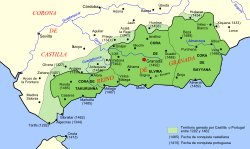Sultan of Granada
| Emirate of Granada | ||||||||||
|
إمارة غرﻧﺎﻃﺔ Imarat Gharnāṭah |
||||||||||
| Tributary state of the Crown of Castile | ||||||||||
|
||||||||||
|
||||||||||
|
Motto Wa lā ghāliba illā-llāh (There is no victor but God) |
||||||||||
|
Territory of the Nasrid Kingdom
|
||||||||||
| Capital | Granada | |||||||||
| Languages | Official language: Classical Arabic Other languages: Andalusi Arabic, Mozarabic, Berber, Ladino |
|||||||||
| Religion | Majority religion: Islam Minority religions: Roman Catholicism, Judaism |
|||||||||
| Government | Hereditary monarchy | |||||||||
| Sultan | ||||||||||
| • | 1238–1273 | Mohammed I ibn Nasr | ||||||||
| • | 1487–1492 | Muhammad XII | ||||||||
| Historical era | Late Middle Ages | |||||||||
| • | Established | 1248 | ||||||||
| • | Castilian conquest | 1492 | ||||||||
|
||||||||||
| Today part of |
|
|||||||||
The Emirate of Granada (Arabic: إمارة غرﻧﺎﻃﺔ, trans. Imarat Gharnāṭah), also known as the Nasrid Kingdom of Granada (Spanish: Reino Nazarí de Granada), was an emirate established in 1248 following the defeat of Muhammad an-Nasir of the Almohad dynasty by an alliance of Christian kingdoms at the Battle of Las Navas de Tolosa in 1212. After Prince Idris left Iberia to take the Almohad leadership, the ambitious Mohammed I ibn Nasr established the last Muslim dynasty on the Iberian peninsula—the Nasrids. The Nasrid emirs were responsible for building the Alhambra palace complex as it is known today. By 1250, the Emirate was the last part of the Iberian peninsula held by the Muslims. Andalusian Arabic was the mother tongue of the majority of the population. For two more centuries, the region enjoyed considerable cultural and economic prosperity.
...
Wikipedia



